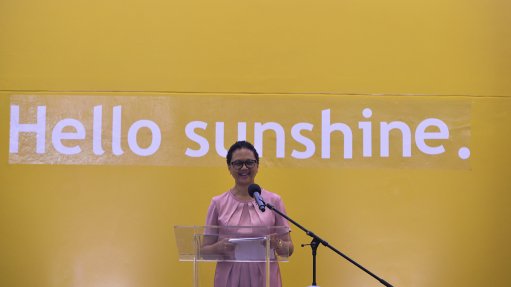
TINA JOEMAT-PETTERSSON The Northern Cape hosts 100% of the CSP and 65% of the solar PV capacity procured in the REIPPPP bid windows
The inauguration last month of renewable-energy project developer Solar Capital’s 90 MW De Aar 3 solar photovoltaic (PV) plant, in the Northern Cape, marked the seventeenth solar PV plant to start commercial operation in the province.
Energy Minister Tina Joemat-Pettersson, who attended the launch, stated that this reaffirmed the province as the “country’s Mecca for the development of renewable-energy sources”.
She added that, since the imple- mentation of the Renewable Energy Independent Power Producer Procurement Pro-gramme (REIPPPP) in 2014, the Northern Cape had attracted the majority of the projects.
Of the 102 projects under the REIPPPP, 51, or 56%, were located in the province, which amounted to an electricity generation capacity of 3 581MW.
Best Conditions“The Northern Cape offers some of the best conditions in the world for solar electricity generation and, therefore, it is not surprising that the province hosts 100% of the concentrated solar power (CSP) and 65% of the solar PV capacity procured in bid windows to date,” the Minister asserted.
She added that this contributed to 72.5%, or 2 112 MW, of the 2 992 MW of solar power generated in South Africa. This figure included three solar power projects, with a procured capacity of 15 MW from small REIPPPPs ranging between 1MW and 5MW.
Joemat-Pettersson highlighted that the Department of Energy (DoE) had earmarked 13 225 MW under the REIPPPP by 2025 and, as such, had introduced the extended REIPPPP 4 bid, which was open to bidders that were not successful in previous bids, as well as “other ready projects”.
A total of 106 submissions amounting to 9 500 MW were received in November last year for the extended bid, of which 6 500 MW were for projects in the Northern Cape.
Meanwhile, Joemat-Petters-son pointed out that the DoE had granted a Ministerial determi-nation for the procurement of a 1 500 MW solar park, which would be developed in the Northern Cape, owing to the concentration of solar projects in the province and the significant availability of solar energy, which supported further investment.
“The planned solar park will provide new impetus for the [province’s] economy by reducing the cost of solar power, owing to economies of scale, creating an opportunity for localisation through the development of a technology manufacturing capability and attracting private-sector investors to operate . . . plants within the park,” she said.
Net ExporterJoemat-Pettersson stated that the electricity made available through current renewable-energy investments in the Northern Cape would provide more energy than the province requires, “effectively making it a net exporter of electricity to other provinces in future”.
This was in line with the province’s Renewable Energy Strategy, which would result in it becoming a net exporter of renewable energy by 2020.
However, she expected that the province would be able to meet this goal “a year or two” before the 2020 deadline, owing to the scheduled commercial operation dates of renewable-energy projects currently under way.